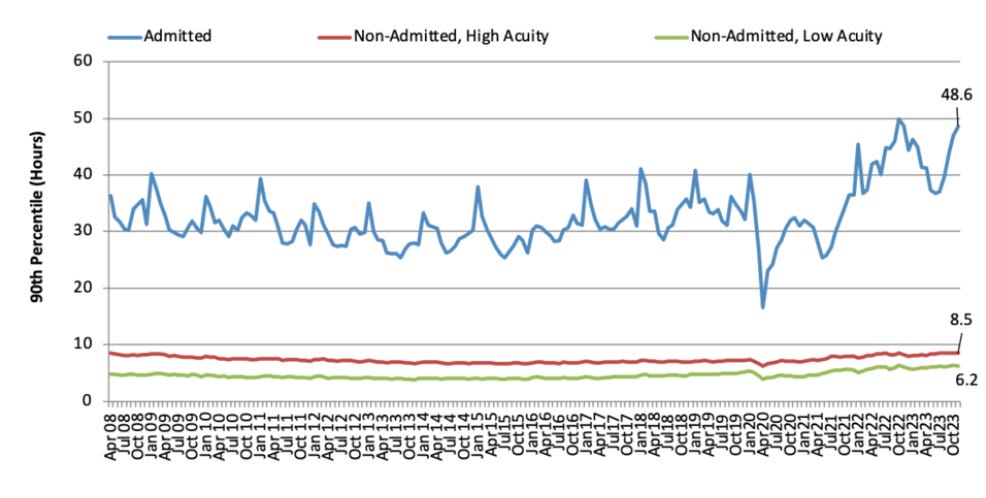You’re reading the web version of The Weekly Dose, our newsletter on health care and medical news. Sign up to get it next Sunday.
Hello Healthwatchers!
Welcome back to your Weekly Dose, where essential health news is on the agenda.
This week, we're zeroing in on the ER crisis and the ongoing collapse of health system resources, spiced up with a few other pressing topics. While some of this week’s stories focus on Ontario, they have far-reaching implications across Canada. I'm here to walk you through it all, ensuring you're at the forefront of these critical developments. Let's first set the stage:
Are we becoming numb to the healthcare crisis?
Health commentator Lisa Machado urges a renewed approach to consuming healthcare crisis stories, advocating for accountability in addressing the systemic failures leading to ER overcrowding and staff burnout.
Why it's important:
Ignoring systemic failures risks normalizing subpar care. Only by demanding change can we make sure the crisis doesn’t become our new new normal.
Machado's commentary cuts to the heart of Canada's healthcare woes, stressing the danger of letting the narrative of crisis lose its urgency. The recurring tales of packed ERs, exhausted staff, and physician shortages must not become background noise; they must fuel actionable change — the right change. The critical point Machado makes is that without holding decisionmakers accountable, the healthcare system's decline will continue unchallenged, with dire consequences for everyone. It isn’t just about today's headlines, but a future where the lack of resources can and will have life-altering repercussions.
Read more…
Ontario expands number of private clinics that can perform OHIP-covered surgeries
Ontario gave the greenlight to more private clinics to perform surgeries covered under OHIP, a decision that’s sparked debate over the move’s impact on public healthcare staffing.
Why it's important:
This strategy to reduce system backlogs is worth intense scrutiny. It doesn’t address the staffing strains at the root of our current healthcare woes, and it’s very likely to make them worse.
Ontario Health data shows 52 underutilized operating rooms in the Toronto area alone, suggesting significant opportunity to expand surgical capacity within the public system. ER wait times are an urgent problem (which we’ll get to shortly), but it’s worth asking serious questions about the validity of this approach. At this point it’s well known that the proliferation of private nursing agencies has ballooned health staffing costs and led, over time, to an exodus of nurses from the public system. This policy will have the same effects; but with nurses, surgeons and anesthesiologists.
Read more…
Ontario experiencing highest-ever ER wait times amid rising patient complexity
A report reveals Ontario ER patients face the longest waits on record, and highlights a demographic shift to a sicker and more medically complex population.
Why it's important:
ER wait times. What’s causing them? The healthcare system is at a tipping point, struggling under the dual weight of bed & staff shortages and sicker patients.
A significant proportion of ER patients are waiting more than 48 hours for a hospital bed. This situation is not solely due to a shortage of beds or staff (though these are big factors) but is also a reflection of the growing complexity and acuity of the patients coming through the door, a shift which occurred with noted abruptness in January of 2022. Physicians report increased complications, including delirium and worsened dementia. This data shows the urgency of structural reforms to address the needs of a patient population that is not only growing in number but also presenting with more complex conditions.
Read more…
Measles vaccination rates in Canada have decreased, PHAC says amid global concern
PHAC flags a dip in Canada's measles vaccinations, reflecting a worldwide trend that could soon have serious implications, raising concerns about the resurgence of measles with exposures across Canada and significant outbreaks bubbling up worldwide.
Why it's important:
Diminishing vaccination threatens to re-open doors to diseases we've fought hard to close. A dangerous consequence of measles is its unique ability to trigger Immune Amnesia, leaving survivors highly vulnerable to all other pathogens.
Canada’s vaccination rates are falling short of the WHO's 95% target, with significant drops in Ontario and Alberta. Experts warn that current rates won’t prevent outbreaks. The WHO and CDC highlight measles as an imminent global threat, emphasizing the need to be vigilant and renew our vaccination efforts. Health officials are urging parents to prioritize children’s vaccines. Some adults may also need to have their immunity checked. Personally, I was vaccinated as a child but when I checked my immunity in my 20s as I headed into nursing school my immunity had faded. Talk to your doctor/NP/walk-in clinic.
Read more…
Rise in Group A strep infections and deaths among children
Provinces are reporting a worrying increase in invasive Group A strep (iGAS) cases, with six child deaths in Ontario and four in B.C. in the last three months.
Why it's important:
The infections are associated with increased cases of viral illness. Viruses break down mucous membranes in the nose and throat, making them susceptible entry points for bacteria. Viruses also leave our immune systems depleted and disrupted, making us more susceptible hosts to opportunistic infection.
iGAS, which is potentially fatal, is a strep infection that can spread beyond typical areas like the throat or skin into the bloodstream. Ontario data shows a near doubling of cases and hospitalizations in the last quarter of 2023 compared to 2022, including six deaths among children. This trend is echoed in other Canadian provinces and globally, in countries like Japan and Sweden, among others. There is common conjecture from medical pundits that increases are due to pandemic restriction measures that took place 2.5 – 4 years ago, depending on the country, but this theory is now widely debunked and doesn’t explain why Sweden, who never locked down, is reporting their highest iGAS numbers since they started keeping track.
Read more…
Dana-Farber Cancer Institute faces scientific misconduct allegations
A scandal surfaces at Dana-Farber Institute with allegations of scientific misconduct involving very prominent researchers in the cancer world, putting the institution's reputation, and scientific integrity, on the line.
Why it's important:
On the surface, it’s a U.S. story, but this affects us. Misconduct allegations raise serious questions about the integrity of influential cancer research affecting global care standards.
The accusations suggest image manipulation in 57 papers, undermining years of scientific work. Retractions and corrections of published papers are underway. The institute's response will be pivotal in reaffirming its esteemed position in the scientific community. This could have ripple effects, affecting the reputation of allied researchers. Canadian agencies might want to re-evaluate their collaborations and financial support for international research projects, and reflect on their own research integrity policies and the robustness of oversight mechanisms.
Read more…
As we wrap this week's edition, I want to thank you for engaging with these topics. It can be tough to read about the ongoing collapse of our national health resources, and it should be!
Your presence in these critical discussions keeps our broader community informed and prepared to face these challenges. If you have insights, questions, or experiences you’d like to share, please reach out at [email protected].
Until our next edition, stay vigilant, informed, and involved in shaping the future of healthcare in our country.
Yours in health,
Nick Tsergas
National Health News Editor
Canada Healthwatch
[email protected] | canadahealthwatch.ca





